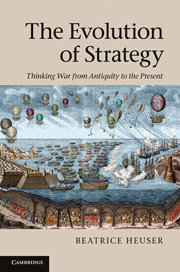Book contents
- Frontmatter
- Contents
- Acknowledgements
- A note on referencing
- Part I Introduction
- PART II Long-term constants
- PART III The Napoleonic paradigm and Total War
- 5 The age and mindset of the Napoleonic paradigm
- 6 The Napoleonic paradigm transformed: From total mobilisation to Total War
- 7 Challenges to the Napoleonic paradigm versus the culmination of Total War
- PART IV Naval and maritime Strategy
- PART V Air Power and nuclear Strategy
- PART VI Asymmetric or ‘small’ wars
- PART VII The quest for new paradigms after the World Wars
- Bibliography
- Index
7 - Challenges to the Napoleonic paradigm versus the culmination of Total War
from PART III - The Napoleonic paradigm and Total War
Published online by Cambridge University Press: 05 June 2012
- Frontmatter
- Contents
- Acknowledgements
- A note on referencing
- Part I Introduction
- PART II Long-term constants
- PART III The Napoleonic paradigm and Total War
- 5 The age and mindset of the Napoleonic paradigm
- 6 The Napoleonic paradigm transformed: From total mobilisation to Total War
- 7 Challenges to the Napoleonic paradigm versus the culmination of Total War
- PART IV Naval and maritime Strategy
- PART V Air Power and nuclear Strategy
- PART VI Asymmetric or ‘small’ wars
- PART VII The quest for new paradigms after the World Wars
- Bibliography
- Index
Summary
Do you want Total War? If necessary, do you want it more total and more radical than we can imagine it today?
(Goebbels’s speech at the Palace of Sports, Berlin, 18 February 1943)Mars mechanised: the Napoleonic paradigm versus technological innovation
We have seen that Americans on both sides of the Civil War rendered homage to the Napoleonic paradigm, which they knew through Jomini’s writings; the Prussians developed their own version of it, ostensibly through their selective reading of Clausewitz but mainly under the increasingly ‘realist’ military leadership of Moltke; the French felt the need to rediscover Napoleonic warfare after their defeat at the hands of the German coalition in 1870/1 which they attributed to the Prussian officers’ studies of Napoleon, again through the medium of Clausewitz. Just as Renaissance men had felt the need to resurrect the wisdom of the ancients and to model their strategies on those of great generals of Antiquity, the emulation of the Napoleonic way of war became the lodestar of strategy from c. 1860 to 1918, as we have seen in the previous chapter.
Nevertheless, there were strong voices who doubted that the Napoleonic paradigm could be applied without significant modifications, pointing to the great technological innovations affecting warfare in this period. Unlike in early modern history, these innovations were both fast in coming and their significance was not denied; however, what the consequences would be was open to debate. In addition to belief in Social Darwinism and biology, and in the right of might, there was the changing factor of technology. The Wars of German Unification and the American Civil War especially had seen revolutionary changes there. Both used railways, the telegraph and industrial mass-production of weapons, ammunition and other equipment, and both harnessed mass armies to a popular cause (Degler 1997: 53–74), which made them ‘industrialised people’s wars’ (Förster and Nagler 1997: 9). Liddell Hart gave a succinct summary of the ‘revolution in warfare’ caused by the new technology from the introduction of the railways and the interwar period (he was writing in 1934):
[The evolution of war since the mid eighteenth] century has been marked by four main trends. First, was the growth of size. From France under the Revolution and Napoleon, to America in the Civil War and Prussia under Moltke, the armies swelled to the millions of 1914–1918. Second, came the growth of fire-power, beginning with the adoption of rifles and breech-loading weapons. This, imposed on size, conduced [sic] to a growing paralysis of warfare on land and sea. Third was the growth of industrialisation … And fourth was the revolutionary growth of mobility, due in turn to the steam engine and the motor.
This revolution of technology had ‘mechanised Mars’ (Liddell Hart 1944: 24f., 69).
- Type
- Chapter
- Information
- The Evolution of StrategyThinking War from Antiquity to the Present, pp. 171 - 198Publisher: Cambridge University PressPrint publication year: 2010



